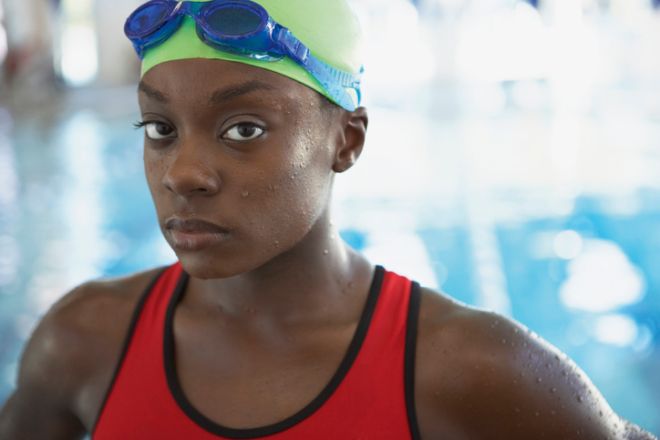
Source: FangXiaNuo / Getty
After SOUL Cap — a brand of swimmers hair caps designed for those with thick and curly hair types — was denied the clearance to be worn at official FINA swimming matches held around the world, including at this year’s Olympics, Black swimmers have been voicing their opinions on the ongoing conversation surrounding the ban.
As MADAMENOIRE previously reported, FINA’s ban on SOUL Cap initially made headlines earlier this month due to all the backlash and criticisms over the organization’s decision. More recently, an update from them shared that the possibility of SOUL Cap being able to be worn at FINA matches was now under “review.”
As of the publishing of this piece, the status of their ruling remains the same.
“As the second Black female swimmer to make a U.S. Olympic team” and a two-time Olympian, Lia Neal shared with The New York Times that FINA’s decision to deny SOUL Cap’s clearance “is so much bigger than banning a type of cap.”
The 26-year-old shared that when wearing a normal swim cap she probably has a adjust it about “20 times in practice.”
She’d announced that she’d be retiring from the sport this past May, the outlet reported.
Neal spoke on how the lack of culturally considerate swim gear for Black athletes affects them in ways it doesn’t hinder their counterparts:
“It’s an obstacle, a nuisance that a lot of my counterparts don’t have to worry about because they don’t have to use the same kind of hair products that I do.”
Danielle Obe, one of the leaders of the Black Swimming Association (based out of the U.K. where Soul Cap was founded), shared in Neal’s sentiments and expounded on them by explaining the conversation surrounding the ban also has to do with the amount of representation Black swimmer’s have in the aquatics industry overall.
“We want to be included,” Obe said. “All we’re asking for is to have the option to have a piece of equipment that has been designed to cater to the issue of our hair, which is a significant barrier to participation in aquatics as a whole.”
She went onto mention, “If FINA was aware that that was a major barrier for our community, I think that decision would have been made slightly differently.”
31-year-old physician Erin Adams — someone who got her start in L.A.’s South Central Swimming League before becoming a Division 1 swimmer at Columbia University — highlighted that as she swam throughout the years the issue of “hair” possibly related to the less and less amount of other Black swimmers she noticed competing as she got older.
“So many people in my family did not learn how to swim because, you know, their hair wouldn’t stay straight, or it’d be too unruly, or whatever,” Erin told NYT. “So I always had braids in my hair when I was younger, and I don’t know why it just didn’t bother me that my hair was different than my peers in swimming.”
While Adams managed the silicone swim caps she wore during practices according to the outlet, their latex counterparts — those used for competing — were a different story.
“The ones for racing were so tight on my edges,” Adams shared. “I hated it. I would have these long braids at Columbia, like the people on 125th Street would be doing my hair and it would be down my back, so me putting my hair in that cap was torture.”
“We’re always policed on what we can wear and what our bodies are looking like, and what our hair is looking like,” she said, commenting on FINA’s ruling and how it’s problematic. “They’re just trying to make it difficult for us to have ease when participating.”









